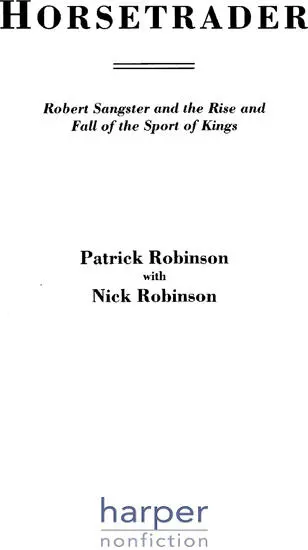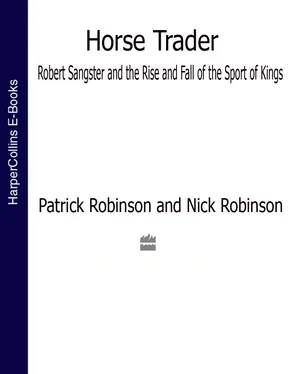
HarperCollins Publishers
1 London Bridge Street
London SE1 9GF
www.harpercollins.co.uk
Published by HarperCollins Publishers 1993
Copyright © Patrick Robinson and Nick Robinson
Patrick Robinson and Nick Robinson assert the moral right to be identified as the authors of this work
A catalogue record for this book is available from the British Library
All rights reserved under International and Pan-American Copyright Conventions. By payment of the required fees, you have been granted the nonexclusive, nontransferable right to access and read the text of this e-book on-screen. No part of this text may be reproduced, transmitted, downloaded, decompiled, reverse-engineered, or stored in or introduced into any information storage and retrieval system, in any form or by any means, whether electronic or mechanical, now known or hereafter invented, without the express written permission of HarperCollins e-books.
HarperCollins Publishers has made every reasonable effort to ensure that any picture content and written content in this ebook has been included or removed in accordance with the contractual and technological constraints in operation at the time of publication.
Source ISBN: 9780002551328
Ebook Edition © JUNE 2016 ISBN: 9780008193379
Version: 2016-06-20
To Joe Thomas and Northern Dancer.
They are both gone now, but they left behind an
eternal flame in the Vale of Tipperary.
Throughout this narrative there are frequent references to huge sums of money, some of them in US dollars and some of them in pounds sterling. We did not attempt to convert these into one single currency, which is the standard editorial practice, because the sums – such as the $10.2 million Keeneland yearling – were often such well-known figures that conversion would have been misleading and almost certainly inaccurate since exchange rates can vary by the hour. A sterling rate of 1.75, for instance, would have converted to ‘the £5,828,571.40 Keeneland yearling’. This would plainly have been absurd. The yearling was bred in the USA, the bidding was in dollars and the colt was paid for in dollars. Thus, when in America we have worked in dollars, and when in England or Ireland we have used pounds – occasionally Irish ones, when a stallion involved an Irish-trained horse going to Coolmore Stud in Tipperary.
There is also the occasional mention of the old-fashioned ‘guineas’ (one pound and one shilling). This is still used at English bloodstock auctions and, where appropriate, we have utilized this measurement. The title of the one-mile classics remains in the old racehorse currency – the 2000 Guineas and the 1000 Guineas. These do not, however, bear any relationship to the modern prize money for these races, which is nowadays over £100,000.
Cover
Title Page
Copyright
Dedication
Authors’ note
Prologue
1 Chalk Stream
2 A Glimpse of the Green
3 Facing the Almighty Dollar
4 The Raiders from Tipperary
5 Empires of Kentucky
6 The Minstrel’s Battle-Song
7 Bonanza in the Bluegrass
8 The Soft Steps of the Bedouin
9 ‘Would You Sell Him for $30 Million?’
10 Three Derbys
11 Tipperary v. Arabia
12 The $40 Million Short-head
13 Summit in the Desert
14 The Crash of ’86
15 The Harder They Fall
16 Running Out of Cash
17 The Magic Touch of the Irish
Epilogue
Index
About the Publisher
Prologue: The Historic Blackballing of Lord Soames
It was always tense in The Rooms when they were proposing to elect a statesman to membership. Actually, it was always tense in The Rooms whomever they were proposing to elect to membership. But a statesman created a special feeling of apprehension. Such an event happened only every fifty years or so, because, by and large, the Jockey Club did not see statesmen as the right calibre of chap. Most of them had depressingly brilliant intellects coupled with dazzling charm and tact. Or, put in the more ducal vernacular of the Club, they were too clever by half, ‘too smarmy’.
The Earl of Rosebery, during his Lordship’s tenure as Prime Minister of England, had of course been a member of the Club back in 1894 when his colt Ladas had won the Derby at Epsom. However, having been a member since the age of twenty-two, the touchy business of electing a statesman had never really applied.
The Jockey Club had admitted an Under-Secretary of State for War, Earl Cadogan, in the middle of the nineteenth century, in the knowledge that he was much preoccupied with the unrest along India’s north-west frontier. The same applied, in smaller measure, to the Marquis of Londonderry and the Earl of Zetland in the 1880s when they were appointed as successive Lords-Lieutenants of Ireland. Different frontier, similar unrest among the natives and one or two furrowed brows in the Club. Lord Randolph Churchill, Chancellor of the Exchequer and owner of an Oaks winner in 1889, had had to be elected. And they could not quite avoid accepting his often fractious son Sir Winston, who won the Jockey Club Cup in 1950 with his stout-hearted grey Colonist II shortly before becoming Prime Minister for the second time.
Of course the greatest of all England’s horse-racing monarchs, King Edward VII, was a member. He would have to be included as a statesman – Emperor of India and Ruler of the Lands Beyond the Seas and all that – but like Rosebery he had not really been considered as such when proposed for membership. Elected at twenty-three, he already owned two Derby winners (Persimmon and Minoru) and, during his frequent stays in Newmarket, he usually took the Jockey Club Rooms, in a private apartment with a private entrance – a discreet little throughway not entirely unfamiliar to the occasional visiting mistress. Upon the death of his mother Queen Victoria in 1901, Edward ascended the throne a few months off his sixtieth birthday in 1901 and by this time he assuredly was ‘one of us’.
These very few apart, then, the Jockey Club had stuck for the past two hundred years to its own kind: land-owning horsemen who understood who was to be trusted and who was not. But today, 3 May 1967, in the hours following the running of the first English classic of the season, the 2000 Guineas, on nearby Newmarket Heath, there was an unmistakable apprehension in the Rooms. Before them this evening was written the name of Arthur Christopher John Soames, former Secretary of State for War, Prime Minister Harold Macmillan’s Minister of Agriculture and Fisheries and a Coldstream Guards officer of the highest quality who had been awarded the Croix de Guerre from a grateful, liberated French nation. He was also the son-in-law of the recently deceased member Sir Winston Churchill.
The eighty-five-year-old Earl of Rosebery, son of the nineteenth-century PM, was worried. The Club employed a legendary, not to mention brutal, ‘blackballing’ system, which ended would-be members’ aspirations with the suddenness of a guillotine. The blackballing box is a tall shiny, wooden case, with a round, tube-like aperture close to the top in which the forearm is placed. The ball can be dropped to either side: left in the ‘YES’ slot, right into the ‘NO’ slot. One ball, dropped in the ‘NO’ slot, by any member, was all it took. No one would ever know precisely who had dropped it in. Far less, why it had been dropped in.
Читать дальше













